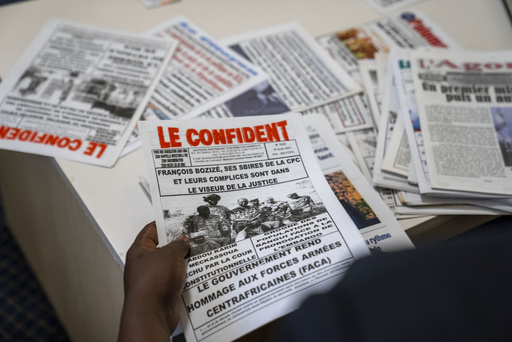
DAKAR, Senegal – In 2019, journalist Ephrem Yaline-Ngonzo was approached by a Russian national who suggested that he help promote the Central African Republic’s (CAR) armed forces and Russian military efforts in the region. Initially, Yaline-Ngonzo believed he was participating in a noble cause. However, he soon discovered that he had been recruited by the Wagner Group, a Russian paramilitary organization, to disseminate propaganda on behalf of the Kremlin as part of its operations in Africa.
Facing intimidation and threats, Yaline-Ngonzo managed to escape to Europe several months ago with assistance from The Platform to Protect Whistleblowers in Africa. Recently, he shared his experience, becoming the first individual to recount the inner workings of the Russian disinformation apparatus in CAR. “It is vital for me to share this story so that justice is served,” he remarked during an interview. “I aim to expose human rights violations and the disinformation strategies that could easily be applied in other nations.”
Over the past three years, Yaline-Ngonzo was involved in creating narratives that glorified the actions of Russian troops and the CAR military government, which has been in power since 2016. His tasks also included organizing anti-Western protests and silencing dissenting opinions. It was only when he was assigned to craft a misleading article intended to suppress critical voices that he began to question his role. “I realized this was against my moral judgment,” he stated. “This is not what journalism is about; I was being pressured to push certain narratives.”
Russia has increasingly emerged as a preferred security partner for several African nations, effectively replacing historic allies such as France and the United States. Since the outbreak of conflict in CAR in 2013—when mainly Muslim rebels ousted then-president François Bozizé—the presence of Wagner operatives has been justified as a means of restoring order. Yet, rather than achieving stability, Wagner forces have been accused of severe human rights abuses while assiduously supporting the authoritarian regime of Faustin-Archange Touadéra.
Reports indicate that Moscow has implemented a comprehensive disinformation campaign across Africa, designed to bolster its image while fostering anti-Western sentiments and undermining democratic governance. The Africa Centre for Strategic Studies highlights that Russia remains a leading source of disinformation on the continent, responsible for nearly 40 percent of all such campaigns.
Yaline-Ngonzo recalled his initial encounter with a Russian named “Micha,” who offered him a salary of 200,000 CFA francs (about $320) per month, significantly more than what he earned as an editor at a local news agency. He believed he was contributing to the restoration of peace, driven by patriotic intentions. However, further investigations led by Forbidden Stories, in collaboration with French newspaper Le Monde, identified “Micha” as Mikhail Mikhailovitch Prudnikov, a Russian agent linked to Yevgeny Prigozhin’s network.
As he accepted higher pay, Yaline-Ngonzo left Potentiel to become the head of Wagner’s liaison with local media. The Wagner Group is notorious for its human rights violations. Reports from Human Rights Watch previously detailed a 2021 incident in Mali where the group, along with the national military, was implicated in the execution of about 300 individuals, most of whom were civilians. In CAR, Wagner operatives reportedly instruct the military on torture techniques, including acts of extreme brutality.
Yaline-Ngonzo explained that he was also pressured to conceal instances of abuse perpetrated by Wagner in the nation. His apprehension grew particularly after a critical article about the group appeared in local media, leading to threats against him. “They blamed me for that article,” he recounted. “There were many implicit threats, and they were closely aligned with the military authorities, which made me fear for my safety.”
In an attempt to escape with his family to France, he was intercepted at the airport by security officers who advised him that “the Russians would take care of you.” Following a brief interrogation, he was released and ordered to return the next day. Instead, Yaline-Ngonzo opted to go into hiding, eventually finding a route to Europe through Congo.
While other journalists in CAR continue to serve Russian interests, Yaline-Ngonzo believes that the effectiveness of Russian propaganda is limited. “The population does not have a favorable view of the Russians,” he said. “Yet, the fear of reprisal silences dissenting voices.”
